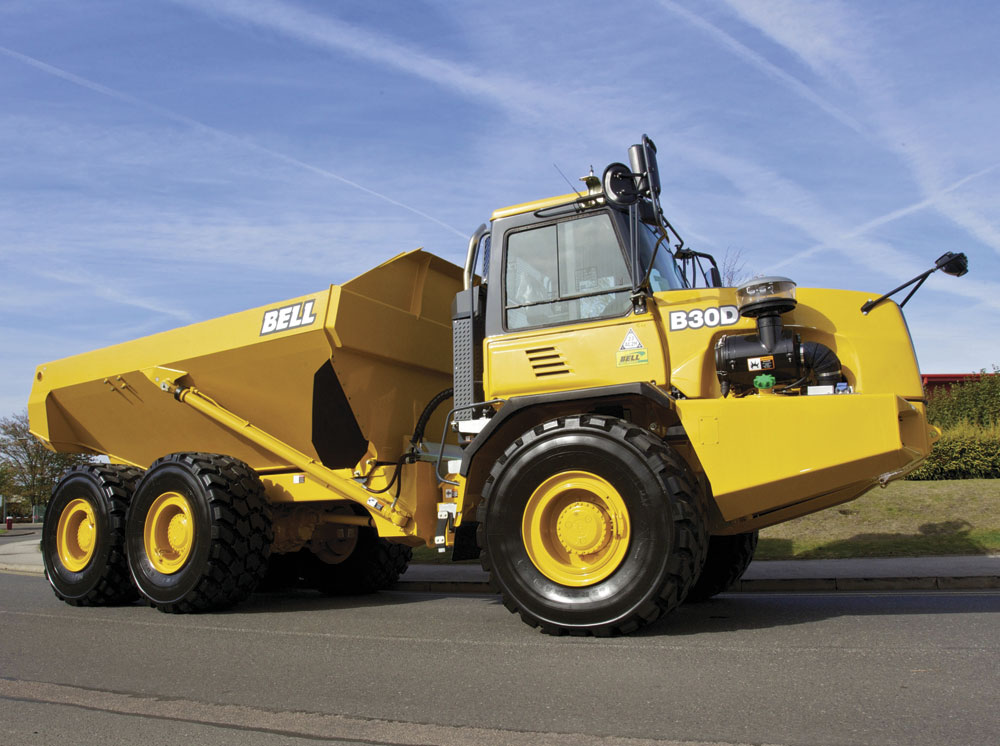AdBlue Is The Colour

Bell begin roll-out of fuel-efficient SCR technology on their ADTs
Articulated dumptruck (ADT) manufacturers across Europe have embarked upon one of the most significant changes to emissions legislation in recent years. Since January 2011, engines built for off-road haulers have had to comply with Tier 3b emissions legislation, which focuses mainly on the reduction of particulate matter (PM) and nitrogen oxide (NOx) gases.
There has been some leniency with the timing to allow engine manufacturers exhaust their inventory of existing Tier 3a engines prior to the introduction of the Tier 3b-compliant units, but Bell are now beginning to roll out their first SCR machines.
The Tier 3b legislation requires manufacturers to reduce PM emissions by 90% and NOx emissions by 50% of Tier 3a requirements. This is only an interim situation, however, as all equipment manufacturers will have to further reduce NOx emissions by an additional 90% when Tier 4 technology is demanded in January 2014.
There are two ways of satisfying the Tier 3b legislation requirements. Some manufacturers have gone down the EGR (exhaust gas recirculation) route and some down the SCR (selective catalytic reduction) route.
EGR technology requires the exhaust gases to be recirculated back through the combustion process prior to being emitted into the atmosphere. This, in itself, brings with it contamination issues that need to be addressed, and it is also restrictive due the fact that ultra-low-sulphur fuel (ULSF) is needed to power this type of engine. Unfortunately, not all parts of the world offer ULSF, thus restricting the usage of these particular machines geographically.
Bell Equipment are in the favourable position of having Mercedes Benz – one of the world’s largest manufacturers of diesel engines for both on-road and off-road applications – as a supplier. With their technical knowledge at hand and two possible solutions – SCR and EGR/DPF (diesel particulate filter) – Bell have, after careful technical evaluations and marketing considerations, chosen to use the less restrictive and more fuel-efficient SCR technology for their ADT range.
SCR technology is currently considered best suited to off-road ADT applications and the geometry of the SCR Stage 3b engine is also very similar to the Stage 2 and Stage 3a engines, which will help ensure that aftermarket support is maintained at the same high standards that Bell customers have become accustomed to.
SCR is a simple, reliable and proven solution requiring few changes to today’s engines and cooling packages. Since the amount of exhaust gas recirculation can be reduced, engine performance can be enhanced and cooling requirements reduced. Moreover, SCR engine platforms require very little maintenance.
SCR platforms will provide customers with reduced emissions, lower fuel consumption, improved engine power and torque, no reduction on service intervals and improved engine response.
Another reason why Bell chose SCR rather than EGR/DPF is because in 2014 all platforms will be using SCR technology in their engine systems.
The Bell SCR system consists of an AdBlue tank, an injector, sensors and wiring harness, and a catalyst. It is estimated that AdBlue usage will equate to approximately 4–6% of the fuel consumed by the engine.
AdBlue itself is a solution made up of 67.5% water and 32.5% urea (a non-hazardous, non-toxic, non-explosive, non-flammable, nitrogen-based compound commonly used in fertilizer). It is available from most petrol/diesel outlets and suppliers, and, in normal operations, fuel and AdBlue are filled up at the same time. For most operators, however, the optimal solution will be to store AdBlue at their own premises.
Bell are offering their customers a total AdBlue supply solution for ADTs that are purchased with SCR technology. This will take the form of various storage systems and supply options, and, since there are no special legal or environmental requirements regarding storage of AdBlue, the company is able to supply AdBlue in 10-, 18-, 210- and 1,000-litre IBC containers, together with various pumping solutions, to ensure simple operation and site compliance. The company’s supply of AdBlue will conform to the DIN 70 070 and ISO 22241 quality standards.
Neville Paynter, managing director of Bell Equipment UK, is pleased with the decision by Bell’s technical designers to take the SCR route over the EGR option. ‘The only real difference our customers will experience is the need for them to periodically top up the AdBlue tank when they are refuelling,’ he said.
‘It will literally take a couple of minutes. This pales into insignificance when you consider the gains customers will get from the extra power and fuel efficiency, and the overall cost per tonne implications of conforming to Tier 3b regulations.
‘The cost of fuel is a major part of our customers’ operating costs – one that appears to be on an upward curve for the foreseeable future. Initial tests show that our Tier 3b trucks have a minimum 5% fuel advantage over our Tier 3a trucks. This is highly significant considering that, even before now, Bell ADTs have consistently seen a 10–15% fuel advantage over competitive models.
‘Also, our Tier 3b engines have the same geometry as before, so there won’t be any steep learning curve in terms of service and maintenance. We believe this will reduce costly downtime compared with those operators who have purchased ADTs that have EGR engine technology.’
Marc Shurmann, Bell’s director of European operations, believes that Bell customers will not only benefit from the SCR technology in the current machines, but will continue to do so beyond 2014 when Tier 4 Final legislation comes in.
‘Tier 4 legislation is far stricter even than Tier 3b, so to meet those emissions regulations we believe all other manufacturers will eventually have to incorporate SCR technology. No other technology currently exists that will be able to meet these strict emissions requirements. We have recognized this and so have decided to ensure our customers experience the least amount of disruption in this process while experiencing even better fuel economy and, therefore, lower operating costs.’
For further information visit: www.bellequipment.co.uk


